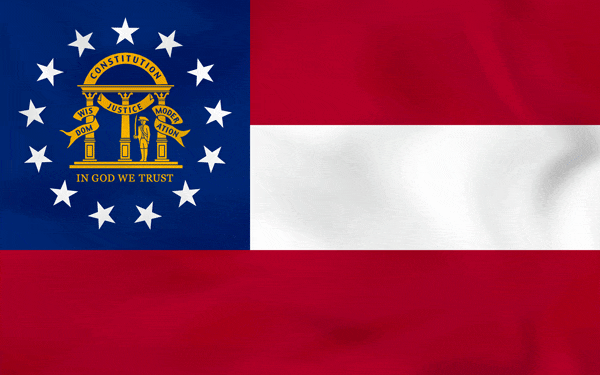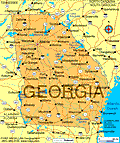Georgia
State abbreviation/Postal code: Ga./GA Governor: Nathan Deal, R (to Jan. 2019) Lieut. Governor: Casey Cagle, R (to Jan. 2019) Senators: Johnny Isakson, R (to Jan. 2023); David Purdue, R (to Jan. 2021); Historical biographies of Congressional members Secy. of State: Brian P. Kemp, R (to Jan. 2019) Atty. General: Sam Olens, R (to Jan. 2019) Entered Union (rank): Jan. 2, 1788 (4) Present constitution adopted: 1983 Motto: Wisdom, justice, and moderation
Nicknames: Peach State, Empire State of the South Origin of name: In honor of George II of England 10 largest cities (2010): Atlanta, 443,775; Augusta-Richmond County,1 197,872; Columbus,1 185,888; Northeast Cobb, 169,756; Savannah, 142,022; Augusta, 136,381; Athens-Clarke County,1 118,999; Sandy Springs, 99,419; Roswell, 93,692; Macon, 91,234 Land area: 57,906 sq mi. (149,977 sq km) Geographic center: In Twiggs Co., 18 mi. SE of Macon Number of counties: 159 Largest county by population and area: Fulton, 977,129 (2012); Ware, 903 sq mi. State forests: 6 (63,294 ac.) State parks: 64 (65,066 ac.) Residents: Georgian 2015 resident population: 10,214,860 2010 resident census population (rank): 9,687,653 (9). Male: 4,729,171 (48.8%); Female: 4,958,482 (51.2%). White: 5,787,440 (59.7%); Black: 2,950,435 (30.5%); American Indian: 32,151 (0.3%); Asian: 314,467 (3.2%); Other race: 388,872 (4.0%); Two or more races: 207,489 (2.1%); Hispanic/Latino: 853,689 (8.8%). 2010 population 18 and over: 7,196,101; 65 and over: 1,032,035 (10.7%); median age: 34.7. 1. The city is part of a consolidated city-county government; the city and county are coextensive. |
Hernando de Soto, the Spanish explorer, first traveled parts of Georgia in 1540. British claims later conflicted with those of Spain. After obtaining a royal charter, Gen. James Oglethorpe established the first permanent settlement in Georgia in 1733 as a refuge for English debtors. In 1742, Oglethorpe defeated Spanish invaders in the Battle of Bloody Marsh.
A Confederate stronghold, Georgia was the scene of extensive military action during the Civil War. Union general William T. Sherman burned Atlanta and destroyed a 60-mile-wide path to the coast, where he captured Savannah in 1864.
The largest state in the southeast, Georgia is typical of the changing South with an ever-increasing industrial development. Atlanta, largest city in the state, is the communications and transportation center for the Southeast and the area's chief distributor of goods.
Georgia leads the nation in the production of paper and board, tufted textile products, and processed chicken. Other major manufactured products are transportation equipment, food products, apparel, and chemicals.
Important agricultural products are corn, cotton, tobacco, soybeans, eggs, and peaches. Georgia produces twice as many peanuts as the next leading state. From its vast stands of pine come more than half of the world's resins and turpentine and 74.4 percent of the U.S. supply. Georgia is a leader in the production of marble, kaolin, barite, and bauxite.
Principal tourist attractions in Georgia include the Okefenokee National Wildlife Refuge, Andersonville Prison Park and National Cemetery, Chickamauga and Chattanooga National Military Park, the Little White House at Warm Springs where Pres. Franklin D. Roosevelt died in 1945, Sea Island, the enormous Confederate Memorial at Stone Mountain , Kennesaw Mountain National Battlefield Park, and Cumberland Island National Seashore. In 2005 the world's largest indoor aquarium, the Georgia Aquarium, opened, showcasing more than 100,000 aquatic animals including the only whale sharks in captivity outside of Asia.
See more on Georgia:
Encyclopedia: Georgia
Encyclopedia: Geography
Encyclopedia: Economy
Encyclopedia: Government
Encyclopedia: History
Monthly Temperature Extremes
All U.S. States: Geography & Climate
Printable Outline Maps
Record Highest Temperatures
Record Lowest Temperatures
Highest, Lowest, and Mean Elevations
Land and Water Area
All U.S. States: Population & Economy
Historical Population Statistics, 1790–Present
Per Capita Personal Income
Minimum Wage Rates
State Taxes
Federal Government Expenditure
Percent of People in Poverty
Births and Birth Rates
Homeownership
Percentage of Uninsured by State
All U.S. States: Society & Culture:
Most Livable States
Healthiest States
Most Dangerous States
Smartest States
Crime Index
Residency Requirements for Voting
Compulsory School Attendance Laws
Driving Laws
National Public Radio Stations
Selected famous natives and residents:
- Conrad Aiken poet;
- James Bowie soldier;
- James Brown singer;
- Jim Brown actor and athlete;
- Erskine Caldwell writer;
- James E. Carter former president;
- Ray Charles singer;
- Lucius D. Clay banker and general;
- Ty Cobb baseball player;
- Ossie Davis actor and writer;
- James Dickey poet;
- Mattiwilda Dobbs soprano;
- Melvyn Douglas actor;
- Rebecca Latimer Felton first appointed woman U.S. senator;
- Roosevelt Grier entertainer and former athlete;
- Oliver Hardy comedian;
- Joel Chandler Harris journalist and author;
- Larry Holmes boxer;
- Miriam Hopkins actress;
- Alan Jackson singer;
- Harry James trumpeter;
- Jasper Johns painter and sculptor;
- Bobby Jones golfer;
- Stacy Keach actor;
- DeForest Kelley actor;
- Martin Luther King, Jr. civil rights leader;
- Gladys Knight singer;
- Joseph R. Lamar jurist;
- Little Richard singer;
- Juliette Gordon Low U.S. Girl Scouts founder;
- Carson McCullers novelist;
- Johnny Mercer songwriter;
- Margaret Mitchell novelist;
- Elijah Muhammad religious leader;
- Jessye Norman soprano;
- Otis Redding singer;
- Julia Roberts actress;
- Jackie Robinson baseball player;
- Dean Rusk former secretary of state;
- Nipsey Russell comedian;
- Michael Stipe singer for the band, R.E.M.;
- Clarence Thomas Supreme Court Justice;
- Travis Tritt singer;
- Alice Walker author;
- Joanne Woodward actress;
- Trisha Yearwood singer.


